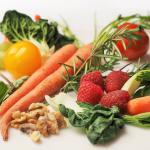Those of you who listened to my radio show last Sunday heard that I was struggling with my voice. You may also have noted that I only answered text messages and took no phone calls.
antioxidants
The easiest method I found to grade a web sites potential reliability was to do a word search for popular categories I was very familiar with, such as organic vs.
Antioxidants are chemical compounds that can be a vitamin, mineral, enzyme, or one of thousands of other naturally occurring plant chemicals and many that are naturally produced by our bodies.
As the call for eating less red-meat grows, the substitutes are raising their game. I have written about the Impossible Burger and I see that a Beyond Chicken is being introduced by the Colonel.
Step aside, paleo diet; there's a new fad in town. Celebrities like Mariah Carey have jumped on the Purple Diet plan, where only purple fruits and veggies are allowed.
Antioxidants are the panacea that has never quite panned out.
In our perpetual more of the same list, yet another study sho
Catch the latest health news: good news on childhood obesity, non-surprising organic crop study, and why the papaya industry is making news again
If you are in the something purple in a bottle will make me l






